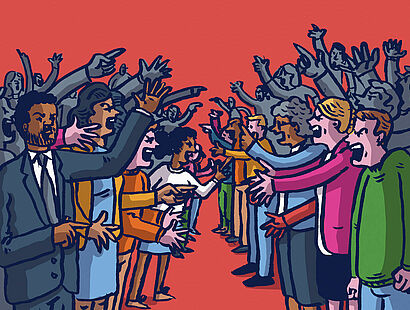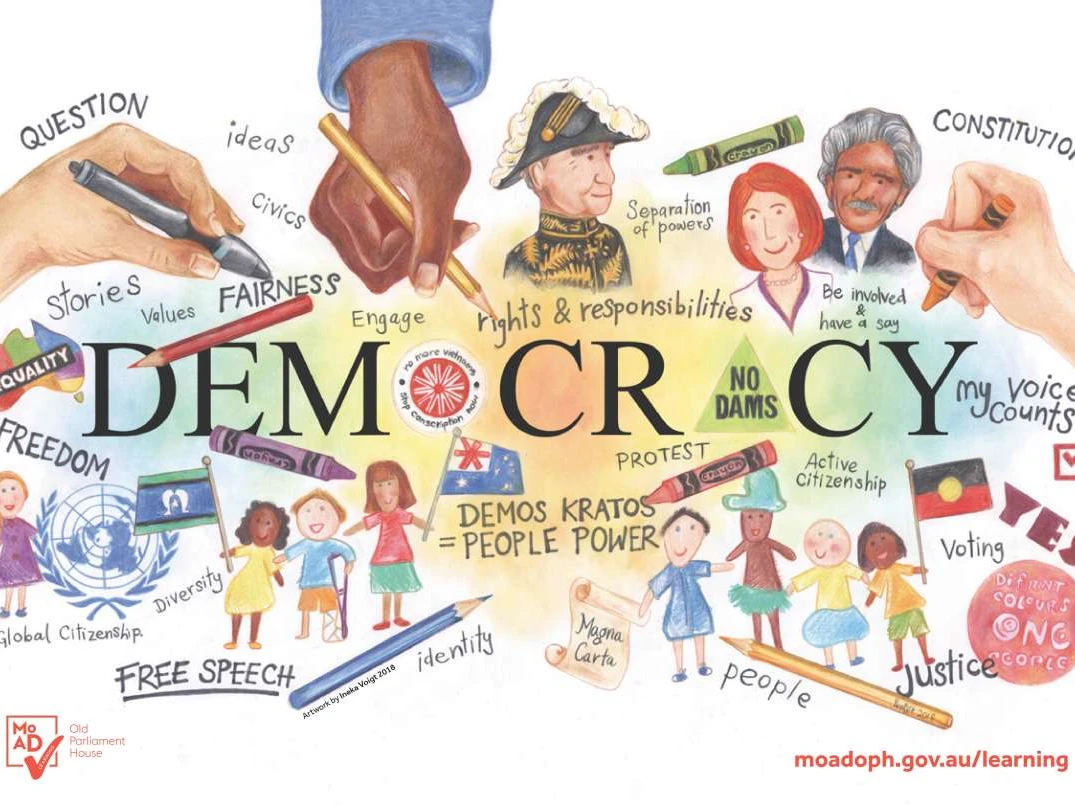Mudabicara.com_ The democratic government system has become one of the most popular political systems adopted by many countries in the modern era, especially after the second world war.
With the main idea of power from the people, by the people and for the people , this democratic political system is able to become a way out of previous political systems.
Now! to further deepen understanding of what a democratic government system is, see the full review of the following below.
Read Also : Definition of the Government System, Types and Examples
Definition of a Democratic Government System

Etymologically democracy comes from two Greek syllables, namely Demos and Cratos. Demos means people or residents of a place while cratos means power or sovereignty.
Whereas in terminology the meaning of demos-cratos is a government in which the sovereignty and power of the government system is based on the people’s decisions.
In a democratic government system, people’s participation is the key word, both direct participation and participation through representative institutions.
In addition, democracy has a foundation that humans basically have the same freedom as well as obligations so that democracy upholds equality between human beings.
However, in practice, the democratic government system is a bit paradoxical where democracy on the one hand requires freedom, opportunities for competition and conflict.
Read Also: Despotism Government System, Definition and Characteristics
But on the other hand democracy also requires social order, consensus and stability so that the middle way to achieve the ideal democracy is the perspective of democracy itself.
Josep A Schmeter in Democracy, Human Rights, Civil Society explains that democracy is an institutional plan to reach political decisions in which individuals gain power to accommodate the aspirations of the people.
Meanwhile, Affan Gaffar, an academic in political science, defines democracy in two forms, namely normative democracy and empirical democracy.
Normative democracy is democracy that ideally wants to be practiced in a country while empirical democracy is democracy whose embodiment is in reality and political practice.
Three Characteristics of Power in a Democratic System
Three characteristics of the embodiment of a democratic government system lie in the government of the people ( government of the people ), government by the people ( government by people ) and government for the people ( government for people ).
First , the government of the people means that the ruling government is the result of elections and agreements from the people so that they legally get legitimacy to rule a country.
Second , government by the people means that a government carries out its duties on the basis of the interests of the people, not personal or group encouragement.
In addition to government by the people in carrying out their duties and functions, the government gets supervision from the community either directly or through a representative council.
This is intended so that government administrators do not abuse their authority and tend to carry out narratives of authoritarianism.
Read Also : Monarchy Government System, Definition, Types and Characteristics
Third, government for the people means that the power given by the people to the government is actually carried out on the basis of the people’s interests.
Therefore, all forms of aspirations, both in the form of criticism and suggestions, must be accommodated by the government so that all forms of policy and political decisions are based on mutual agreement.
The prerequisite is the practice of political freedom so that the democratic system is able to improve conditions and situations both socially, culturally and economically together and in mutual cooperation.
The meaning of togetherness is the involvement and participation of the community in the formulation, development and decision-making of both political, legal and economic decisions.
Electoral System in a Democratic Government System

In the presidential election mechanism, the democratic government system uses an election mechanism either directly or through representative institutions using political party vehicles.
For example, in the United States (US) presidential election, one of the presidents who pocketed the most votes did not necessarily serve as president.
The reason is that the president of the United States is elected by a representative body or better known as the electoral college.
The American people when it comes to voting, they don’t actually choose a president but rather choose the figures who will sit in the electoral college.
After the electoral college election process is complete, the task and function of the electoral college is to elect the president and vice president.
In practice, the people who run for the electoral college are the people who represent political parties at the state level.
Read Also : Dictator Government System, Definition, Causes and Characteristics
Usually the people who are nominated are those who have closeness, party figures and party officials who are certainly affiliated with one of the presidential and vice presidential candidates.
At polling stations, photos of electoral college candidates are usually below their presidential candidate but in some cases they are not listed.
In contrast to Indonesia, which has a one-man-one-vote mechanism with direct elections, the president who has the most votes can sit as president.
In the end, the consensus on democratic practices depends on the policy mechanisms in each country so that in general, democracy varies from one country to another.
Characteristics of a Democratic Government System
1. Citizens Have the Right to Vote and Be Elected
In a democratic government system, every citizen is given the freedom to make political choices or nominate themselves as contestants in political events.
2. Citizens have freedom of assembly, opinion and association
One of the foundations of a democratic government system is freedom so that every citizen has the opportunity to form political parties and organizations.
Read Also : Democratic Political System, Definition, Types and Characteristics
3. Citizens Have the Right to Obtain Information
There are four pillars of the establishment of a democratic political system, namely the existence of an executive, legislative, judicial and press freedom so that every citizen under the auspices of democracy has the right to obtain information.
4. Citizens Have Equal Rights Before the Law
Before the law, every citizen has the same position, regardless of social and economic strata, so that the rule of law is upheld in this government system.
5. Narrative of inclusiveness in nation and state
In a democratic government system, the narrative of inclusiveness is an important factor. Awareness of differences and diversity is the initial foundation for the creation of a solid democratic system.
A social life that recognizes and respects each other will create a political habitat that is mutually critical and constructive for the common good.
6. Upholding the Rule of Law
Freedom in democracy certainly cannot be separated from the rules of the game. The rules of the game are usually in the form of conventional and binding laws.
This is intended so that individual freedom in democracy does not interfere with the freedom of other individuals so that a clear social order is formed.
7. There is a political party
The only legal way to gain power in a democracy is through political parties. The function of political parties, apart from being a vehicle, also serves as a forum for the aspirations of the people.
Read Also : Plutocracy Government System, Definition and Characteristics
This means that the interests of political parties are none other than the interests of the people themselves, all candidates who are nominated will struggle to realize what the people aspire to.
8. Accommodating Minority Interests
Equality in a democratic government system is proven by accommodating the interests of minorities. In front of politics and law all have the same rights regardless of class, race, ethnicity and religion.
That’s all for this explanation of the democratic government system, see you on other discussions of political science. Happy reading!

